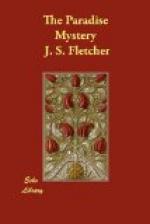Bryce read and re-read the contents of the two bills. And then he thought for awhile before speaking.
“Well,” he said at last, “there’s probably this in it—the Folliots are very wealthy people. Mrs. Folliot, it’s pretty well known, wants her son to marry Miss Bewery—Dr. Ransford’s ward. Probably she doesn’t wish any suspicion to hang over the family. That’s all I can suggest. In the other case, Ransford wants to clear himself. For don’t forget this, Mitchington!—somewhere, somebody may know something! Only something. But that something might clear Ransford of the suspicion that’s undoubtedly been cast upon him. If you’re thinking to get a strong case against Ransford, you’ve got your work set. He gave your theory a nasty knock this morning by his few words about that pill. Did Coates and Everest find a pill, now?”
“Not at liberty to say, sir,” answered Mitchington. “At present, anyway. Um! I dislike these private offers of reward—it means that those who make ’em get hold of information which is kept back from us, d’you see! They’re inconvenient.”
Then he went away, and Bryce, after waiting awhile, until night had settled down, slipped quietly out of the house and set off for the gloom of Paradise.
CHAPTER XVI
BEFOREHAND
In accordance with his undeniable capacity for contriving and scheming, Bryce had made due and careful preparations for his visit to the tomb of Richard Jenkins. Even in the momentary confusion following upon his discovery of Collishaw’s dead body, he had been sufficiently alive to his own immediate purposes to notice that the tomb—a very ancient and dilapidated structure—stood in the midst of a small expanse of stone pavement between the yew-trees and the wall of the nave; he had noticed also that the pavement consisted of small squares of stone, some of which bore initials and dates. A sharp glance at the presumed whereabouts of the particular spot which he wanted, as indicated in the scrap of paper taken from Braden’s purse, showed him that he would have to raise one of those small squares—possibly two or three of them. And so he had furnished himself with a short crowbar of tempered steel, specially purchased at the iron-monger’s, and with a small bull’s-eye lantern. Had he been arrested and searched as he made his way towards the cathedral precincts he might reasonably have been suspected of a design to break into the treasury and appropriate the various ornaments for which Wrychester was famous. But Bryce feared neither arrest nor observation. During his residence in Wrychester he had done a good deal of prowling about the old city at night, and he knew that Paradise, at any time after dark, was a deserted place. Folk might cross from the close archway to the wicket-gate by the outer path, but no one would penetrate within the thick screen of yew and cypress when night had fallen. And now, in early summer, the screen of trees and bushes was so thick in leaf, that once within it, foliage on one side, the great walls of the nave on the other, there was little likelihood of any person overlooking his doings while he made his investigation. He anticipated a swift and quiet job, to be done in a few minutes.




